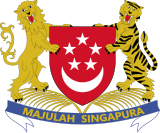| This article is part of a series on |
 |
|---|
|
|
General elections in Singapore must be held within three months after five years have elapsed from the date of the first sitting of a particular Parliament of Singapore, as per the Constitution. However, Parliament can also be dissolved and a general election called at the behest of the Prime Minister before the five-year period elapses. The number of constituencies or electoral divisions is not permanently fixed by law, but is declared by the Prime Minister prior to each general election pursuant to the Parliamentary Elections Act (Cap. 218, 2011 Rev. Ed.), which governs the conduct of elections to Parliament, taking into account recommendations of the Electoral Boundaries Review Committee.
In Singapore, the Parliament is unicameral. For the 2020 general election, there are 93 elected seats in Parliament organised into 14 Single Member Constituencies (SMCs) and 17 Group Representation Constituencies (GRCs). Each SMC returns one Member of Parliament (MP) while each GRC returns between three and six MPs, at least one of whom must be from the Malay, Indian or other minority communities. A group of persons wishing to stand for election in a GRC must all be members of the same political party, or a group of independent candidates. The voting age in Singapore is 21.
The most recent general election was held on 10 July 2020. The People's Action Party (PAP) was returned to power to form the Government with 83 seats, while the Workers' Party (WP) secured ten seats by winning in Aljunied GRC, Hougang SMC and Sengkang GRC.


